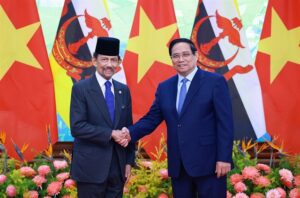Brunei Friday Sermon Emphasises Virtue of Sending Selawat Upon Prophet Muhammad (PBUH)

Bandar Seri Begawan, The Gulf Observer: Muslims across Brunei Darussalam were reminded of the immense virtue and blessings of sending selawat (peace and blessings) upon Prophet Muhammad (peace be upon him) in today’s Friday sermon delivered at mosques nationwide.
Titled “The Virtue and Merit of Sending Selawat”, the sermon encouraged congregants to strengthen their love for the Prophet (PBUH) through consistent remembrance and the practice of his teachings. Worshippers were urged to observe taqwa (piety) and heed Allah’s command in Surah Al-‘Imran, verse 102: “O you who believe! Fear Allah as He should be feared, and do not die except as Muslims.”
The sermon highlighted the blessings of the month of Rabiulawal, during which Muslims commemorate the birth of the Prophet (PBUH), who was sent as a mercy to mankind, guiding humanity from ignorance to enlightenment and from falsehood to truth. His noble character, sacrifices, and steadfast efforts in spreading Islam were cited as a model for all Muslims to emulate.
Verses from the Qur’an, including Surah Saba’ (28) and Surah At-Tawbah (128), were quoted to underscore the Prophet’s (PBUH) deep compassion and mercy for his ummah (community). Worshippers were also reminded of Allah’s command in Surah Al-Ahzab (56): “Indeed, Allah and His angels send blessings upon the Prophet. O you who believe! Send blessings upon him and greet him with peace.”
The sermon elaborated on the numerous virtues of reciting selawat, including attaining Allah’s mercy, forgiveness, and elevated status in His sight. It was emphasised that selawat facilitates the acceptance of supplications, purifies the heart and mind, offers protection from harm, and brings blessings and sustenance.
A hadith narrated by Imam Bukhari was cited: “Whoever sends one selawat upon me, Allah will send ten selawat upon him, erase ten of his sins, and raise him ten degrees.” Worshippers were also cautioned against neglecting this practice, with a narration from Imam Tirmidhi stating: “The miser is the one in whose presence I am mentioned and he does not send selawat upon me.”
Concluding the sermon, Muslims were urged to make selawat a daily practice, not only during Rabiulawal but throughout their lives, as a demonstration of love for the Prophet (PBUH) and a means of seeking his intercession in the Hereafter.


